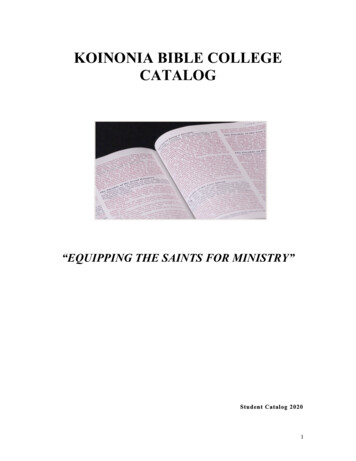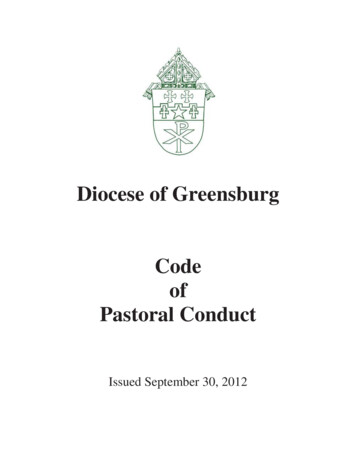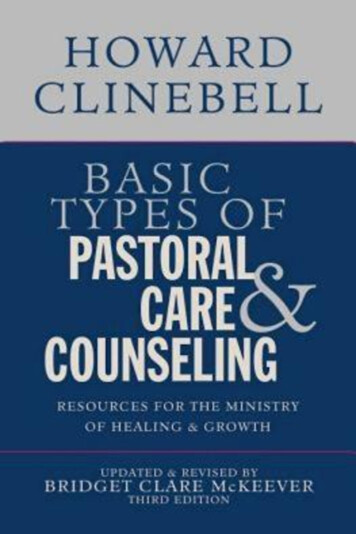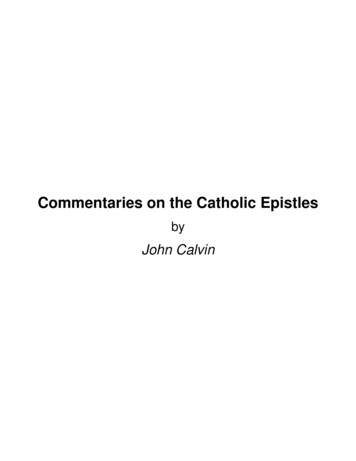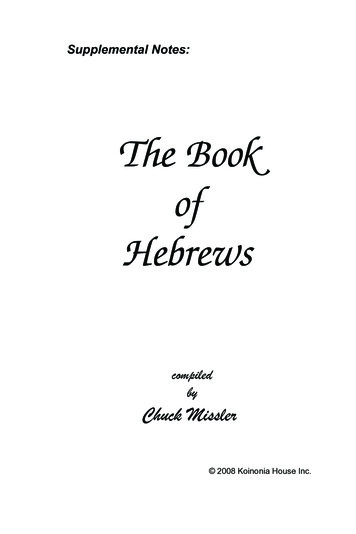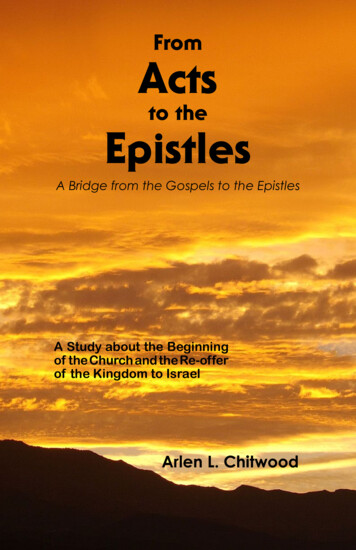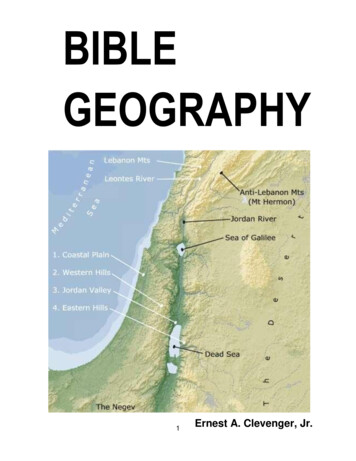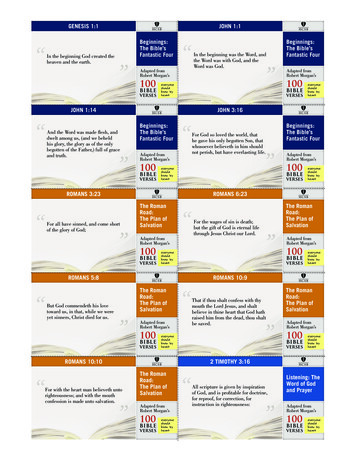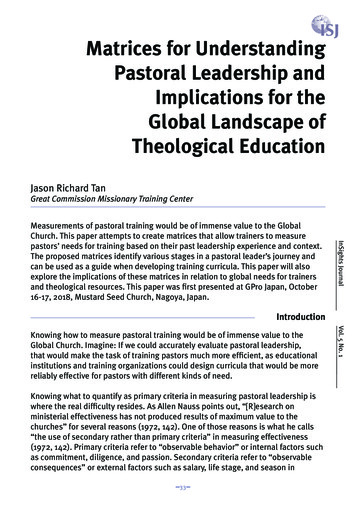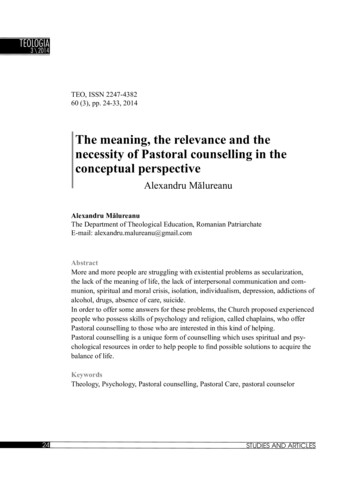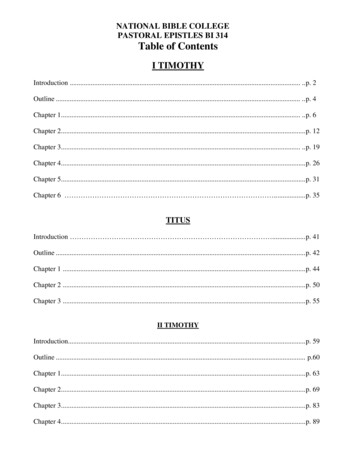
Transcription
NATIONAL BIBLE COLLEGEPASTORAL EPISTLES BI 314Table of ContentsI TIMOTHYIntroduction . .p. 2Outline . .p. 4Chapter 1. .p. 6Chapter 2.p. 12Chapter 3. .p. 19Chapter 4.p. 26Chapter 5.p. 31Chapter 6 .p. 35TITUSIntroduction .p. 41Outline .p. 42Chapter 1 .p. 44Chapter 2 .p. 50Chapter 3 .p. 55II TIMOTHYIntroduction.p. 59Outline . p.60Chapter 1.p. 63Chapter 2.p. 69Chapter 3.p. 83Chapter 4.p. 89
NATIONAL BIBLE COLLEGEPASTORAL EPISTLES BI 3142I TIMOTHYI. The Pastoral Epistles: The two letters to Timothy and the one to Titus are called the “PastoralEpistles” because they contain principles for the pastoral care of churches and thequalifications for ministers.II. Authorship of I Timothy: The Apostle PaulA. The writer calls himself Paul [ (I Timothy 1:1), the personal references (I Timothy 1:13, 15)sense of divine calling (1 Timothy 2:7)].B. The arguments against Pauline Authorship:1. Paul’s travels described in Pastoral do not fit anywhere in Acts.2. The church organization described is that of the 2nd century3. The vocabulary and style are different from that of other Pauline lettersC. The arguments for Pauline Authorship:1. Acts does not contain the complete history of the life of Paul, since his death is notrecorded in Acts. He was released from his first imprisonment in Rome, traveled forseveral years, rearrested, imprisoned a second time in Rome, and martyred under Nero.2.Nothing in the church organization requires a later date3. Subject matter could require different vocabulary and style i.e. vocabulary to describechurch organization would be different from vocabulary for Doctrine of H.S.III. Date and place of writing [62-63 AD, probably from Macedonia]IV. Occasion: I Timothy was written to Paul’s young apprentice. Who Paul called “my true son inthe faith ” (v.2). Paul had left Timothy in Ephesus to continue the work at the churchlocated in that city. Since Paul was to be delayed in coming to him, Paul wanted to instruct hisyoung understudy on “how people ought to conduct themselves in God’s household ”(I Timothy 3:15). This, of course, is not a reference to a building but the gathering of God’speople, a reference to the local assemblies. In addition, he charged Timothy personally to fightthe good fight, to enforce sound doctrine, to ensure that church leaders are sufficientlyqualified, that they are motivated by spiritual considerations and not worldly prestige ormaterial gain. Timothy was also to warn against false teachers and their destructive doctrine.Even though this is a letter written to Timothy it is also official rather than private. Thecontents were not meant for Timothy alone, but were for the edification of the whole church.These are church matters not just personal issues.
NATIONAL BIBLE COLLEGEPASTORAL EPISTLES BI 3143V. The Recipient: TimothyHe was the son of a Greek father and a devout Jewish mother named Eunice. Timothy wasclosely associated with Paul from the terms of the second missionary journey (II Timothy 1:5;Acts 1—I Timothy 6:1-3). It is possible that the young Timothy had a timid, retiringdisposition, and frail health, who needed encouragement.Several passages may indicate this:I Timothy 4:12I Timothy 4:14I Timothy 4:15-16I Timothy 5:23Despite Timothy’s apparent weakness, Paul had tremendous confidence in him, sending him tosuch a strategic city as Ephesus. As Paul, himself, said “Therefore I will boast all the moregladly about my weaknesses so that Christ’s power may rest on me.” II Corinthians 12:9bIn our weakness, Christ’s power can be manifested!VI. The City & Church at Ephesus:(see Hebert p. 253-256.)VII. The Purpose.So that the Lord’s people would know how to conduct themselves in the household of God.I Timothy 3:15VIII. Distinctive Features of I TimothyA. A good look at church order in the 60’s AD.B. Requirements for elders and deacons.C. Gives roles in church of men and women, slaves, masters, young and old, widows.D. Gives guide lines for Pastoral Ministry.IX. Key Scripture: I Timothy 3:15
NATIONAL BIBLE COLLEGEPASTORAL EPISTLES BI 314I TimothyOUTLINENote: This course follows the outlines by the late D. Edmund Hiebert.Hiebert, D. Edmund, “An Introduction to the Pauline Epistles” Chicago: Moody Press, 1954I. Introduction I Timothy 1:1-2A. The writer—I Timothy 1:1B. The reader—I Timothy 1: 2aC. The greeting—I Timothy 1: 2bII. Charge Concerning Sound Doctrine—I Timothy 1:3-20A. The Danger to Sound Doctrine—I Timothy 1:3-111. The nature of a strange doctrine—I Timothy 1:3-42. The goal of sound doctrine—I Timothy 1:53. The perversion of sound doctrine—I Timothy 1:6-11B. The Demonstration of Sound Doctrine—I Timothy 1:12-171. The position under the law—I Timothy 1:12-132. The position under grace—I Timothy 1:143. The example of conversion—I Timothy 1:15-164. Praise for conversion—I Timothy 1:17C. The Responsibility of Timothy to Sound Doctrine—I Timothy 1:18-201. The charge to Timothy—I Timothy 1:18-19a2. The neglect of some—I Timothy 1:19b-20III. Charge Concerning Church Order—I Timothy 2:1-3; 16A. The Worship of the Church—I Timothy 2:1-151. Prayer in public worship—I Timothy 2:1-8a. The kinds of prayer—I Timothy 2:1ab. The objects of prayer—I Timothy 2:1b-2ac. The reason for prayer—I Timothy 2:2b-4d. The basis for prayer—I Timothy 2:5-7i. Christ our mediator—I Timothy 2:5ii. Christ our ransom—I Timothy 2:6-7e. The manner of prayer—I Timothy 2:82. Women in public worship—I Timothy 2:9-15a. Their dress—I Timothy 2:9-10b. Their action—I Timothy 2:11-15i. Learn in Submissiveness—I Timothy 2:11-12ii. Reason on for Submissiveness—I Timothy 2:13-14iii. Result of Submissiveness—I Timothy 2:15B. The Leadership of the Church—I Timothy 3:1-71. The office of overseer—I Timothy 3:1-7a. The honor of the office—I Timothy 3:1b. The qualifications for the office—I Timothy 3:2-72. The office of deacon—I Timothy 3:8-13a. The qualifications for the office—I Timothy 3:8-12b. The reward of the office—I Timothy 3:134
NATIONAL BIBLE COLLEGEPASTORAL EPISTLES BI 314C. The Reason for the Charge to Church Order—I Timothy 3:14-161. Because of Paul’s absence—I Timothy 3:142. Because of Timothy’s responsibility—I Timothy 3:153. Because of the truth possessed by the church—I Timothy 3:16IV. Charge Concerning the Ministry of Timothy—I Timothy 4:1-—I Timothy 6:2A. Concerning Doctrine—I Timothy 4:1-161. The fact of false teachers—I Timothy 4:1-5a. The source of their teaching—I Timothy 4:1-2b. The content of their teaching—I Timothy 4:3c. The refutation of their teaching—I Timothy 4:4-52. The responsibility of a good minister—I Timothy 4:6-16a. Teach sound doctrine—I Timothy 4:6b. Refuse fables—I Timothy 4:7ac. Live godly—I Timothy 4:7b-11d. Be an example—I Timothy 4:12e. Neglect not your gifts—I Timothy 4:14-15B. Concerning Relationships with Various Groups—I Timothy 5:1-—I Timothy 6:21. Ministering to the young & old —I Timothy 5:1-22. Concerning widows—I Timothy 5:3-16a. Older widows —I Timothy 5:3-10b. Younger widows—I Timothy 5:11-163. Concerning elders—I Timothy 5:17-25a. The honor due elders—I Timothy 5:17-18b. The discipline of elders—I Timothy 5:19-21c. The ordination of elders—I Timothy 5:22-254. Concerning slaves —I Timothy 6:1-2a. Those with unbelieving masters —I Timothy 6:1b. Those with believing masters —I Timothy 6:25. Charge concerning godly living —I Timothy 6:3-16a. The necessity for sound instruction —I Timothy 6:3-5b. The relationship of godliness and riches —I Timothy 6: 6-10c. The eternal perspective of a godly life —I Timothy 6: 11-166. The rich can be godly —I Timothy 6:17-19a. The proper attitude —I Timothy 6:17b. The proper conduct —I Timothy 6:18c. The proper goal —I Timothy 6:19V. Conclusion —I Timothy 6:20-21A. The Concluding Charge —I Timothy 6:20-21a1. What to guard —I Timothy 6:202. What to avoid —I Timothy 6:21aB. The Concluding Word —I Timothy 6:21b5
NATIONAL BIBLE COLLEGEPASTORAL EPISTLES BI 314I.Introduction—I Timothy 1:1-2A. The writer—I Timothy 1:1B. The reader—I Timothy 1:2aC. The greeting—I Timothy 1:2b6
NATIONAL BIBLE COLLEGEPASTORAL EPISTLES BI 314II. Charge Concerning Sound Doctrine—I Timothy 1:3-20A. The Danger to Sound Doctrine—I Timothy 1:3-111. The nature of a strange doctrine—I Timothy 1:3-47
NATIONAL BIBLE COLLEGEPASTORAL EPISTLES BI 3142. The goal of sound doctrine—I Timothy 1:53. The perversion of sound doctrine—I Timothy 1:6-118
NATIONAL BIBLE COLLEGEPASTORAL EPISTLES BI 314B. The Demonstration of Sound Doctrine—I Timothy 1:12-171. The position under the law—I Timothy 1:12-132. The position under grace—I Timothy 1:143.The example of conversion—I Timothy 1:15-169
NATIONAL BIBLE COLLEGEPASTORAL EPISTLES BI 3144. Praise for conversion—I Timothy 1:17C. The Responsibility of Timothy to Sound Doctrine—I Timothy 1:18-201. The charge to Timothy—I Timothy 1:18-19a10
NATIONAL BIBLE COLLEGEPASTORAL EPISTLES BI 3142. The neglect of some—I Timothy 1:19b-2011
NATIONAL BIBLE COLLEGEPASTORAL EPISTLES BI 314III. Charge Concerning Church Order—I Timothy 2:1-3:16A. The Worship of the Church—I Timothy 2:1-151. Prayer in public worship—I Timothy 2:1-8a. The kinds of prayer—I Timothy 2:1a1) Requests2) Prayers3) Intercession4) Thanksgivingb. The objects of prayer—I Timothy 2:1b-2a-Everyone12
NATIONAL BIBLE COLLEGEPASTORAL EPISTLES BI 314c. The reason for prayer—I Timothy 2:2b-41)2)3)4)d. The basis for prayer—I Timothy 2:5-7i. Christ our mediator—I Timothy 2:5ii. Christ our ransom—I Timothy 2:6-713
NATIONAL BIBLE COLLEGEPASTORAL EPISTLES BI 314e. The manner of prayer—I Timothy 2:82. Women in public worship—I Timothy 2:9-15a. Their dress—I Timothy 2:9-1014
NATIONAL BIBLE COLLEGEPASTORAL EPISTLES BI 314b. Their action—I Timothy 2:11-15i. Learn in Submissiveness—I Timothy 2:11-12ii. Reason for Submissiveness—I Timothy 2:13-14a) Creation15
NATIONAL BIBLE COLLEGEPASTORAL EPISTLES BI 314b) Deceivediii. Result of Submissiveness—I Timothy 2:15FOUR VIEWS OF CHILD BEARING—I Timothy 2:131. Physical salvation in childbirth view:2. Spiritual salvation through childbirth view:16
NATIONAL BIBLE COLLEGEPASTORAL EPISTLES BI 3143. Spiritual salvation in the home view:4. Spiritual salvation through the incarnation of Christ view:17
NATIONAL BIBLE COLLEGEPASTORAL EPISTLES BI 314B. The Leadership of the Church—I Timothy 3:1-71. The office of overseer—I Timothy 3:1-7a. Duties of the office in the New Testamenti. Feed the flockii. Be examples to the flockiii. Minister to spiritual needsiv. Guard himselfv. Be humbleb. The honor of the office—I Timothy 3:118
NATIONAL BIBLE COLLEGEPASTORAL EPISTLES BI 314c. The qualifications for the office—I Timothy 3:2-7i. Above reproachii. Husband of one wifeiii. Temperateiv. Self-controlled (prudent)19
NATIONAL BIBLE COLLEGEPASTORAL EPISTLES BI 314v. Respectablevi. Hospitablevii. Able to teachviii. Not given to wineix. Not violent20
NATIONAL BIBLE COLLEGEPASTORAL EPISTLES BI 314x. Gentlexi. Free from the love of moneyxii. Manage his own householdxiii. Not a new convertxiv. A good reputation21
NATIONAL BIBLE COLLEGEPASTORAL EPISTLES BI 314VARIOUS VIEWS ON “HUSBAND OF ONE WIFE”:1. Married to the church view2. Prohibition of polygamy3. Prohibition of remarried widowers view4. Prohibition of unmarried overseers view5. Prohibition of divorce view22
NATIONAL BIBLE COLLEGEPASTORAL EPISTLES BI 3142. The office of deacon—I Timothy 3:8-13[Beginning of office—Acts 6 dj iako/nov]a. The qualifications for the office—I Timothy 3:8-121). Worthy of respect2). Sincere3). Not addicted to wine4). Not pursuing money5). Holding the faith in a clear conscience6). Beyond reproachb. The women v. 11 Parentheical to the deacons qualifications1). Dignified2). Not gossips3). Temperate4). Trustworthy in all things23
NATIONAL BIBLE COLLEGEPASTORAL EPISTLES BI 31424 start .The place of women in Scripture1.Women at creation2Women in Jesus ministry3Women in the life and ministry of the early church4Women in the writings of Paul and PeterConclusion: end .
NATIONAL BIBLE COLLEGEPASTORAL EPISTLES BI 31425(Deacon’s qualifications continued from page 23)7). Husband of only one wife –(see elders p. 22)8). Manage his household wellc. The reward of the office –I Timothy 3:13 start .DISCUSSION ON FEMALE DEACONS (deaconesses) - 3:111. The use of “likewise”2. The word wife (KJV) is the word women3. Wives of elders not mentionedend
NATIONAL BIBLE COLLEGEPASTORAL EPISTLES BI 314C. The Reason for the Charge to Church Order—I Timothy 3:14-161. Because of Paul’s absence—I Timothy 3:142. Because of Timothy’s responsibility—I Timothy 3:153. Because of the truth possessed by the church —I Timothy 3:16IV. Charge Concerning the Ministry of Timothy—I Timothy 4:1-6:2A. Concerning Doctrine—I Timothy 4:1-1626
NATIONAL BIBLE COLLEGEPASTORAL EPISTLES BI 3141. The fact of false teachers—I Timothy 4:1-5Daniel 7, 8Matthew 24II Thessalonians 2II Timothy 3:1I John 2:18a. The source of their teaching—I Timothy 4:1-2 (demons)start .FOUR VIEWS OF THE CAUTERIZED CONSCIENCE (4:2)1. The calloused from constant violation view.2. The ownership marks of Satan view.3. The self-condemnation view4. The radical act of perversion viewend .27
NATIONAL BIBLE COLLEGEPASTORAL EPISTLES BI 314b. The content of their teaching—I Timothy 4:31) Forbidding to marry2) Abstain from fooda) Certain foodsb). All food for a timec. The refutation of their teaching—I Timothy 4:4-51) God created it2) You can give thanks for it28
NATIONAL BIBLE COLLEGEPASTORAL EPISTLES BI 3142. The responsibility of a good minister—I Timothy 4:6-16a. Teach sound doctrine—I Timothy 4:6b. Refuse fables—I Timothy 4:7a29
NATIONAL BIBLE COLLEGEPASTORAL EPISTLES BI 31430c. Be a godly example—I Timothy 4:7b-12v. 8v. 9v. 10labor strive start FOUR VIEWS OF THE “SAVIOR OF ALL MEN” (4:10)See Kent textbook for these views – Page 153-1541. Universalist Interpretation – All men will be saved2. Providential Interpretation – God give certain grace to all men3. Potential-actual -4. Temporal-eternal -end
NATIONAL BIBLE COLLEGEPASTORAL EPISTLES BI 314v. 12 don’t anyone look down on your youthfulness. (in 30s)be an example in:1.2.3.4.5.d. Attend to the duties of ministry—I Timothy 4:13-161) Public meetings—I Timothy 4:13Devote yourself to:1.2.3.2) Neglect not your gift—I Timothy 4:14I Corinthians 12-14; Ephesians 4:11Timothy’s gift:Confirmed:Subjectively by means of his spiritual giftObjectively by the prophecy about himCollectively by laying on of hands of the elders31
NATIONAL BIBLE COLLEGEPASTORAL EPISTLES BI 3143) The exhortation to fulfill these duties—I Timothy 4:15-16a) Be diligentb) Watch life and doctrineB. Concerning Relationships with Various Groups—I Timothy 5:1- 6:21. Ministering to the young & old—I Timothy 5:1-22. Concerning widows—I Timothy 5:3-16a. Older widows—I Timothy 5:3-101) She is completely alone2) She has set hope on God3) She lives a godly life32
NATIONAL BIBLE COLLEGEPASTORAL EPISTLES BI 314b. Younger widows—I Timothy 5:11-163. Concerning elders—I Timothy 5:17-25a. The honor due elders—I Timothy 5:17-181) --well2) The worker deserves his wages.33
NATIONAL BIBLE COLLEGEPASTORAL EPISTLES BI 31434start VARIOUS VIEWS OF “DOUBLE HONOR” (5:17)William Hendrickson Commentary (Baker) – p. 1801. Honor and honorarium – both honor and material reward2. Ample pay, better remuneration. i.e. twice the salary3. Twice as much honor as widows, i.e. twice as great a portion.4. Honor as brothers and as rulers.5. Honor as elders, extra honor if they rule well.end .b. The discipline of elders—I Timothy 5:19-21
NATIONAL BIBLE COLLEGEPASTORAL EPISTLES BI 314c. The ordination of elders—I Timothy 5:22-2535
NATIONAL BIBLE COLLEGEPASTORAL EPISTLES BI 3144. Concerning slaves—I Timothy 6:1-2a. Those with unbelieving masters—I Timothy 6:136
NATIONAL BIBLE COLLEGEPASTORAL EPISTLES BI 314b. Those with believing masters—I Timothy 6:25. Charge concerning godly living—I Timothy 6:3-16a. The necessity for sound instruction—I Timothy 6: 3-537
NATIONAL BIBLE COLLEGEPASTORAL EPISTLES BI 314b. The relationship of godliness and riches—I Timothy 6: 6-1038
NATIONAL BIBLE COLLEGEPASTORAL EPISTLES BI 31439start THE RESULTS OF DESIRING TO BE RICH(Kent commentary p. 188-191)1. It causes falling into temptation2. It causes falling into a snare.3. It causes falling into many senseless and harmful lusts.4. It causes men to sink into destruction and perdition.5. It causes wandering from the faith.6. It causes many griefs.end .c. The eternal perspective of a godly life—I Timothy 6: 11-166. The rich can be godly—I Timothy 6:17-19a. The proper attitude—I Timothy 6:17
NATIONAL BIBLE COLLEGEPASTORAL EPISTLES BI 314b. The proper conduct—I Timothy 6:18c. The proper goal—I Timothy 6:1940
NATIONAL BIBLE COLLEGEPASTORAL EPISTLES BI 314V. Conclusion—I Timothy 6:20-21A. The Concluding Charge —I Timothy 6:20-21a1. What to guard—I Timothy 6:202. What to avoid—I Timothy 6:21aB. The Concluding Word—I Timothy 6:21b41
NATIONAL BIBLE COLLEGEPASTORAL EPISTLES BI -------------------------------------Notes from Hiebert’s Introduction to Titus*I.The Addressee of TitusA. BackgroundB. WorkC. CharacterII.Churches of CreteA. LocationB. OriginC. ConditionsIII.Occasion for Titus42
NATIONAL BIBLE COLLEGEPASTORAL EPISTLES BI 314IV.Place and Date of TitusA. PlaceB. DateC. BearersV.Purpose of TitusA. AuthorizationB. InstructionC. InformationVI.Characteristics of Titus*Introduction to the Pauline Epistles, D. Edmund Hiebert, Moody Press, ------------------------DATE:A.D. 66 to Titus in Crete1. Paul visited there after release2. Founded church3. Left Titus there –Titus 1:543
NATIONAL BIBLE COLLEGEPASTORAL EPISTLES BI 314THEME:Church order and be devoted to good worksPURPOSE:Finish organization – cf. I TimothyDISTINCTIVE FEATURES:1. Illustration of grace of God–Titus 2:11-14 and 3:4 -72. Six references to good works–Titus 1:16; 2:7, 14; 3:1, 8, 143. Many major doctrines – text, p. 310Election–Titus 1:1Eternal life–Titus 1:2; 3:7Saviorhood and deity of Christ–Titus 1:3-4; 2:13Inspiration–Titus 2:5KEY SCRIPTURE: –Titus 1:544
NATIONAL BIBLE COLLEGEPASTORAL EPISTLES BI 314Outline of TitusTHE SALUTATION (1:1-4)1. The writer (1-3)a. The designation of his office (1a)b. The nature of his office (1b)c. The basis of his office (2-3a)d. The function of his office (3b)2. The reader (4a)3. The greeting (4b)I. CONCERNING ELDERS AND ERRORISTS IN CRETE (1:5-16)A. The appointment of elders in the Cretan churches (5-9)1. The duties of Titus in Crete (5)2. The qualification of elders in the congregations (6-9)a. The general qualifications of the elder (6)b. The personal qualifications of the bishop (7-8)1) The need for blamelessness as God’s steward (7a)2) The qualifications as God’s steward (7b-8)c. The doctrinal qualification of the bishop (9)B. The refutation of the false teachers in Crete (10-16)1. The picture of the false teachers (10-13a)a. The character of the false teachers (10)b. The necessary refutation of the false teachers (11a)c. The effect of the seductive work of these teachers (11b)d. The justification for the severity (12-13a)2. The exhortation to the churches concerning false teaching (13b-14)3. The condemnation of the false teachers (15-16)a. The impurity of mind of the false teachers (15)b. The self-contradictory position of the false teachers (16)II. CONCERNING THE NATURAL GROUPS IN THE CONGREGATIONS (2:1-15)A. The instructions to the groups as to character and conduct (1-10)1. The duty of Titus properly to instruct the members (1)2. The instructions relative to various age groups (2-6)a. The instructions concerning the older men (2)b. The instructions concerning the older women (3)c. The instructions concerning the younger women (4-5)d. The instructions concerning the younger men (6)3. The personal example of Titus (7-8)a. The duty to be an example of good works (7a)b. The directions concerning the nature of his teaching (7b-8a)c. The result of such an example (8b)4. The exhortation to the slaves (9-10)a. The attitude to be enjoined on slaves (9a)b. The conduct of the slaves (9b-10a)c. The motive for such conduct by slaves (10b)45
NATIONAL BIBLE COLLEGEPASTORAL EPISTLES BI 314B. The grace of God as the motive power for the Christian life (11-14)1. The manifestation of the grace of God (11)2. The instruction of the grace of God (12)3. The expectation of Christ’s return (13)4. The summary of our redemption (14)C. The restatement of the duty of Titus (15)III. CONCERNING BELIEVERS AMONG MEN GENERALLY (3:1-11)A. The obligations of believers as citizens (1-2)1. The obligation in relation to the government (1)2. The obligation in relation to citizens generally (2)B. The motivation for such a godly life (3-8a)1. The motivation from the past (3)2. The motivation from our present salvation (4-7)a. The source of the salvation (4)b. The basis of the salvation (5a)c. The means of the salvation (5b-6)1) The washing of regeneration (5b)2) The renewing of the Holy Spirit (5c-6)d. The result of the salvation (7)3. The motivation from the connection between doctrine and conduct (8a)C. The reaction of spiritual truth and error (8b-11)1. The evaluation of these things as profitable (8b)2. The attitude of Titus toward false teaching (9-11)a. His attitude toward false teaching (9)b. His attitude toward a factious man (10-11)THE CONCLUSION (3:12-15)1. The personal matters (12-14)a. The instructions concerning Titus himself (12)b. The instructions concerning Zenas and Apollos (13)c. The instructions concerning the Cretan Christians (14)2. The salutations (15)46
NATIONAL BIBLE COLLEGEPASTORAL EPISTLES BI 314TITUSI. The Salutation—Titus 1:1-4A. The writer—Titus 1:1-31. The designation of his office—Titus 1: 1a2. The nature of his office—Titus 1: 1b3. The basis of his office—Titus 1: 2-3a47
NATIONAL BIBLE COLLEGEPASTORAL EPISTLES BI 3144. The function of his office—Titus 1: 3bB. The reader—Titus 1: 4aC. The greeting—Titus 1: 4b48
NATIONAL BIBLE COLLEGEPASTORAL EPISTLES BI 314II. Concerning elders and errorists in Crete —Titus 1:5-16A. The appointment of elders in the Cretan churches—Titus 1: 5-91. The duties of Titus in Crete—Titus 1: 52. The qualification of elders in the congregations—Titus 1:6-9a. The general qualifications of the elder—Titus 1:61) Above reproach2) Husband of one wife3) Faithful children who are not rebelliousb. The personal qualifications of the bishop—Titus 1:7-81) The need for blamelessness as God’s steward—Titus 1:7a49
NATIONAL BIBLE COLLEGEPASTORAL EPISTLES BI 3142) The qualifications as God’s steward—Titus 1: 7b-8a) Not self-pleasingb) Not quick temperedc) Not given to drunkennessd) Not a strikere) Not greedy for moneyf) Hospitableg) Loving the goodh) Sensiblei) Just –50
NATIONAL BIBLE COLLEGEPASTORAL EPISTLES BI 314j) Holy – un-pollutedk) Self-controlledc. The doctrinal qualification of the bishop—Titus 1:9B. The refutation of the false teachers in Crete—Titus 1:10-161. The picture of the false teachers—Titus 1:10-13aa. The character of the false teachers—Titus 1:10b. The necessary refutation of the false teachers—Titus 1:11a51
NATIONAL BIBLE COLLEGEPASTORAL EPISTLES BI 314c. The effect of the seductive work of these teachers—Titus 1:11bd. The justification for the severity—Titus 1:12-13a2. The exhortation to the churches concerning false teaching—Titus 1:13b-143. The condemnation of the false teachers—Titus 1:15-16a. The impurity of mind of the false teachers—Titus 1:15b. The self-contradictory position of the false teachers—Titus 1:1652
NATIONAL BIBLE COLLEGEPASTORAL EPISTLES BI 314II. CONCERNING THE NATURAL GROUPS IN THE CONGREGATIONS—Titus 2:1-15A. The instructions to the groups as to character and conduct—Titus 2:1-101. The duty of Titus properly to instruct the members—Titus 2:12.The instructions relative to various age groups—Titus 2:2-6a. The instructions concerning the older men—Titus 2: 2b. The instructions concerning the older women—Titus 2:3c. The instructions concerning the younger women—Titus 2:4-553
NATIONAL BIBLE COLLEGEPASTORAL EPISTLES BI 314d. The instructions concerning the younger men—Titus 2:63. The personal example of Titus—Titus 2:7-8a. The duty to be an example of good works—Titus 2:7ab. The directions concerning the nature of his teaching—Titus 2:7b-8ac. The result of such an example—Titus 2:8b54
NATIONAL BIBLE COLLEGEPASTORAL EPISTLES BI 3144. The exhortation to the slaves—Titus 2:9-10a. The attitude to be enjoined on slaves—Titus 2: 9ab. The conduct of the slaves—Titus 2: 9b-10ac. The motive for such conduct by slaves—Titus 2:10bB. The grace of God as the motive power for the Christian life—Titus 2:11-141. The manifestation of the grace of God—Titus 2:1155
NATIONAL BIBLE COLLEGEPASTORAL EPISTLES BI 3142. The instruction of the grace of God—Titus 2:123. The expectation of Christ’s return—Titus 2:134. The summary of our redemption—Titus 2:1456
NATIONAL BIBLE COLLEGEPASTORAL EPISTLES BI 314C. The restatement of the duties of Titus—Titus 2:1557
NATIONAL BIBLE COLLEGEPASTORAL EPISTLES BI 314III. Concerning believers among men generally—Titus 3:1-11A. The obligations of believers as citizens—Titus 3:1-21. The obligation in relation to the government—Titus 3:12. The obligation in relation to citizens generally—Titus 3:2B. The motivation for such a godly life—Titus 3:3-8a58
NATIONAL BIBLE COLLEGEPASTORAL EPISTLES BI 3141. The motivation from the past—Titus 3:32. The motivation from our present salvation—Titus 3:4-7a. The source of the salvation—Titus 3:4b. The basis of the salvation—Titus 3:5ac. The means of the salvation—Titus 3:5b-61) The washing of regeneration—Titus 3:5b2) The renewing of the Holy Spirit—Titus 3:5c-659
NATIONAL BIBLE COLLEGEPASTORAL EPISTLES BI 314d. The result of the salvation—Titus 3:73. The motivation from the connection between doctrine and conduct—Titus 3: 8aC. The reaction to spiritual truth and error—Titus 3:8b-111. The evaluation of these things as profitable—Titus 3: 8b2. The attitude of Titus toward false teaching—Titus 3:9-11a. His attitude toward false teaching—Titus 3:960
NATIONAL BIBLE COLLEGEPASTORAL EPISTLES BI 314b. His attitude toward a factious man—Titus 3:10-11IV. The conclusion—Titus 3:12-15A. The personal matters—Titus 3:12-141. The instructions concerning Titus himself—Titus 3:122. The instructions concerning Zenas and Apollos—Titus 3:13)3. The instructions concerning the Cretan Christians—Titus 3:14B. The salutations—Titus 3:15C. The benediction—Titus 3:1661
NATIONAL BIBLE COLLEGEPASTORAL EPISTLES BI 3142 TimothyAUTHOR: PaulDATE: A.D. 67THEME: Holding the truth in the ministryPURPOSE: To show the certainty of the Scriptures in the ministryDISTINCTIVE FEATURES:1. Commends his mother and grandmother 1:52. Gives Paul’s assurance of eternal life 1:123. Argues for individual loyal
NATIONAL BIBLE COLLEGE 4 PASTORAL EPISTLES BI 314 I Timothy OUTLINE Note: This course follows the outlines by the late D. Edmund Hiebert. Hiebert, D. Edmund, "An Introduction to the Pauline Epistles" Chicago: Moody Press, 1954 I. Introduction I Timothy 1:1-2 A. The writer—I Timothy 1:1 B. The reader—I Timothy 1: 2a C.
